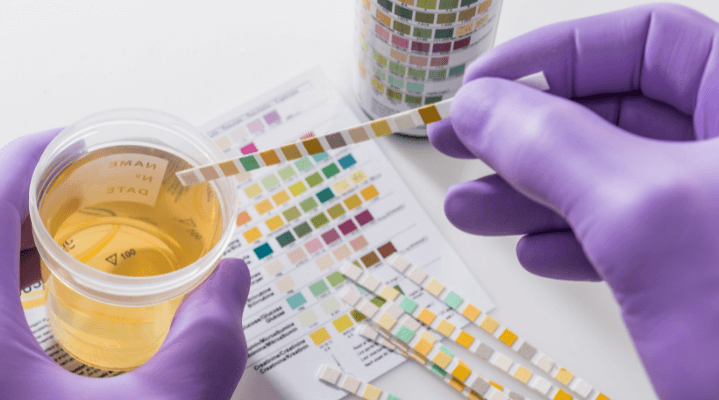Health Hub
What does the colour of your urine mean for your health?
Sorry, we couldn't find any posts. Please try a different search.

Going to the toilet to pass urine is a routine activity for most of us, but sometimes the colour of our urine isn’t quite what we’d expect. There are many reasons why this might be.
If you’ve experienced brown, red, orange or even blue urine, you may be alarmed and wondering why. You may also be wondering what colour your urine should be and what an unusual colour might mean for your health. In this article, King Edward VII Hospital consultant urologist, Mr Marios Hadjipavlou explains what the colour of your urine might mean, what conditions it might be a symptom of and when you should make lifestyle changes or seek medical help.
What does the colour of my urine mean?
The colour of your urine can be an indicator of something not quite right or the symptom of a particular health condition.
Normal urine should resemble the colour of straw, or a pale yellow colour and be transparent. If your urine is any other colour or is cloudy or frothy, here’s what that could be telling you.
What does clear urine mean?

There is no strict recommended daily water intake level as individual needs differ. Our water intake needs depend on factors such as age, size, physical activities and any recommendations for specific fluid intake due to a medical conditions. any relevant medical conditions such as heart disease or recurrent urinary stones.
It is however recommended that a healthy, young adult drinks around 1.5 – 2 litres of water a day.
Generally speaking, thirst and urine colour are good indicators of how well hydrated we are. If you feel thirsty, it’s important to drink. If your urine is more concentrated than pale yellow, it’s also important to drink more water. If your urine is clear with no colour, resembling clean water, you may be drinking more than you need.
Only in rare circumstances, such as exercising at a high intensity for prolonged periods in a hot environment, should you drink more than 3 litres of water a day (unless there is a medical reason to do so).
There are some conditions that can cause excessive thirst (polydipsia) resulting excessive urination (polyuria). This can sometimes be associated with endocrine conditions such as diabetes. If you’re concerned about excessive thirst or urination, speak to your GP.
What does yellow / amber urine mean?

Normal urine should be pale yellow but a light amber colour is also acceptable. If your urine is dark amber, it may suggest that you’re dehydrated and it should be rectified by drinking more water.
Some vitamin supplements can also cause the urine to turn temporarily bright yellow which is you don’t need to be concerned about.
What does red / pink urine mean?

Unexplained pink or red urine may suggest that there is blood present in your urine. This could be a sign of something serious, even if there’s no other pain or symptoms. It’s therefore important that you’re seen by a specialist urologist to discover why there might be blood in your urine. Even if it only happens a single time and then stops, you should still seek further medical advise as it always warrants further investigations.
Blood in the urine is called haematuria and there are several health conditions that can cause it, most of which are benign. The bleeding can originate from anywhere in the urinary tract, including the kidneys, ureter, bladder or the urethra. It may also originate from the prostate in men.
Causes of blood on the urine can range from an infection, kidney or bladder stones to a narrowing of the urethra to bladder or kidney cancer, and most rarely cancer of the urterer, urethra or prostate. Red urine is certainly the most serious and concerning of all colours by far, in both men and women.
In men it can indicate prostate enlargement or cancer, so it’s important to be seen by a specialist urologist as soon as possible.If bleeding is found to be due to benign prostate enlargement, medication can sometimes help to control this, or in more severe cases, a minimally invasive operation may be offered by the urologist to remove part of the prostate that is causing bleeding (HoLEP or TURP).
In women, blood in the urine can be mistaken for blood coming from the vagina.
If you have blood in your urine, your specialist may perform blood tests, urine tests, a CT or ultrasound scan and a cystoscopy – where a camera is inserted into the urethra and bladder under a local anaesthetic.
Pink or red urine doesn’t always indicate the presence of blood. Eating a significant amount of certain foods such as beetroots or blackberries may cause pink or red urine. As can certain medications such as the antibiotic rifampicin and Pyridium which is used to ease pain in the urinary tract.
When do you need a flexible cystoscopy?
What if there are blood clots in my urine?
Blood clots in the urine suggest that there is a significant amount of bleeding. This is a medical emergency and requires a visit to A&E. Blood clots can sometimes block the flow of urine, causing urinary retention which needs urgent medical attention and catheterisation.
How can I avoid urine infections?

Urine infections, often referred to as urinary tract infections, UTIs or cystitis, are more common in women than men. This is due to the fact the urethra is shorter in women and there’s therefore less distance for bacteria to travel before reaching the bladder and causing an infection.
In order to reduce the frequency of urine infections, women can find it helpful to drink more water, go to the toilet before and after having sex and practice good personal hygiene. If you’re experiencing frequent urine infections (more than 2 UTIs in 6 months or 3 in a year), speak to your GP for a referral to a urologist for investigations into their cause.
In men, urine infections are rare and for this reason should be investigated by a urologist even if you’ve only had one occurrence. This is because it may be a sign of a kidney or bladder stone, an enlarged prostate or a new predisposing medical condition such as diabetes.
What does orange urine mean?

Orange urine can be a sign of dehydration and can be rectified by drinking plenty of water. Some medications can also cause orange urine including some laxatives, anti-inflammatories and chemotherapy drugs.
Sometimes, orange urine can be a symptom of a problem with the liver or bile duct, especially if you also have pale stools.
Try rehydrating with water first, and if this doesn’t help, see your doctor.
What does blue / green urine mean?

Blue or green coloured urine is very rare and although alarming, is very rarely associated with severe disease.
Food additives and colourings can cause a blue or green tinge to the urine and a certain type of urine infection caused by a bacteria called Pseudomonas can cause the urine to appear green.
Certain medications, such as amitriptyline, an antidepressant, or indomethacin an anti-inflammatory, can also cause the urine to develop a green or blue colour.
There are also certain medical procedures and tests that when carried out on your kidneys or bladder, can cause this type of discoloration of the urine.
Blue urine can sometimes be seen in children with a rare inherited disorder called familial benign hypercalcaemia.
What does dark brown urine mean?

Certain foods such as rhubarb, aloe vera and fava beans can cause the urine to appear dark brown if eaten in significant quantities. Dark brown urine can also be a sign of severe dehydration. Taking the antibiotic metronidazole can also cause the same.
Liver disease, a condition called porphyria and intrinsic kidney conditions where the filtering part of the kidney is damaged can also lead to dark brown urine. If you’re concerned about dark brown urine, speak to your GP, but if you are also feeling unwell then it is best to attend A&E.
Dark brown urine is also sometimes seen in fit, young men after intense exercise which can result in a mild and reversible form of acute kidney damage. In certain cases, further evaluation by a nephrologist (medical kidney specialist) may be needed.
What does cloudy urine mean?
Cloudy urine is usually the sign of an infection and is sometimes, but not always, associated with stinging or burning on urination, foul smelling urine and bladder discomfort. Speak to your GP who may perform a urine test and may prescribe antibiotics. If this happens frequently, it may need further investigation by a urologist.
What does foamy urine mean?
When we urinate, it’s normal for there to be a few bubbles forming as our urine hits the water in the toilet. If these bubbles are abundant and don’t quickly disappear, it could be down to protein in the urine.
Protein in the urine can be caused by leaky kidneys where the filtering process is compromised. This can be due to an infection, certain medications or an autoimmune condition and should be investigated by a GP or Nephrologist. .
How often should I be going to the toilet?
How often we need to go to the toilet will depend on how much we drink. But as a general rule, we should aim to pass urine when our bladder is comfortably full.
It’s good practice to avoid holding onto an uncomfortably full bladder. Similarly, it’s best to avoid going to the toilet every time we get the first sensation that our bladder has some urine in it. Doing so can bring on the habit of urinating frequently, which can become problematic when we’re outside or not near a toilet.
Lifestyle and hygiene factors for a healthy bladder

Water is the best fluid for our bodies and we should aim to stay well hydrated each day. But this doesn’t mean that we shouldn’t be enjoying other drinks such as juices, squashes and hot drinks (within moderation).
However, tea, coffee, cola and energy drinks all contain caffeine. Caffeine is a diuretic, causing us to pass more urine. This also stimulates the muscle of the bladder and making it more irritable, causing symptoms such as urinary frequency and urgency. Alcohol is also dehydrating so these kinds of drinks should be enjoyed responsibly and matched drink for drink with water.
Hygiene wise, good genital hygiene is important. Wash your genitals in the bath or shower daily, and change your underwear each day.
Many soaps and shower gels contain strong detergents and perfumes that can irritate our sensitive genital area. If you find your genitals becoming irritated, swap to a mild soap or wash the region with copious amounts of water only.
In women, passing urine before and after sex and washing soon after sex can help to avoid bacteria building up and entering the bladder.
Why do some people ignore their urine colour rather than seeking help?
Many people may not look in the toilet bowl, or they may simply flush straight away, meaning that they don’t see their urine. Others may simply ‘brush it off’ if they only see red urine once and then it goes back to normal. However even a single episode of blood in the urine needs to be evaluated thoroughly, fairly urgently.
Are there any particular people who should pay particular attention to their urine colour and frequency?
Smokers are at a far higher risk of bladder cancer than non-smokers and should make a concerted effort to look at their urine frequently but also have their urine checked for presence of non-visible (microscopic) blood in their urine by having a quick spot test that can be done by a GP.
Also, those working in industries dealing with certain carcinogenic chemicals, for example in the tyre or dye industry, should also keep an eye on their urine. Although complications linked to these industries are now extremely rare in the developed world.
Patients that have had treatment for unrelated cancers using pelvic radiotherapy or certain chemotherapy drugs may also be at increased risk of developing urine problems. People with unexplained recurrent or chronic urinary infections may also need to see a specialist urologist to rule out certain diseases, even if they haven’t noticed blood in their urine.
More information
- If you’re concerned about the colour of your urine or the frequency at which you urinate, speaking to your GP is a good first step for getting help with your symptoms. If you don’t have a GP, you can make an appointment with one of our same day, private GPs.
- The King Edward VII Hospital’s Urology Department is one of the UKs leading centres for urology. Make an enquiry today.
Article Sections
Latest Hospital News
Should you wish to speak to our press team, please visit Press Enquiries




